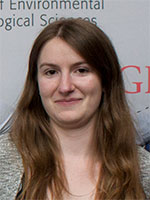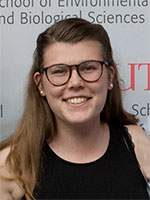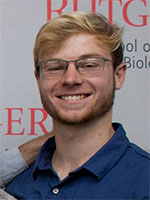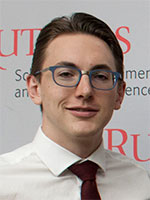
Six awards are presented annually by the Department of Ecology, Evolution, and Natural Resources.
The award winners are as follows:

Mary Powley
M. Buell Award for Outstanding Student in Ecology
I started my journey at Rutgers four years ago as a member of the inaugural class of the Honors College. At the beginning of my second year, I began assisting Dr. Kimberly Russell with her project regarding the potential for areas under powerline rights-of-way to provide habitat for native bees. During the summer of 2017, I participated in a Research Experience for Undergraduates, where I assisted Dr. Alexandra Harmon-Threatt of the University of Illinois—Urbana-Champaign in her investigation of bee movement and diversity in Missouri glades. Upon returning to Rutgers for my third year, I took a more active role in Dr. Russell's lab by acting as the undergraduate lab manager and leading field teams for our sampling sessions. I have also assisted Dr. Jean-Marie Hartman on her GIS-based Delaware River Basin project. The culmination of my time at Rutgers was the completion of my George H. Cook Honors' Thesis, titled "Native Bee Utilization of Powerline Rights-of-Way and Adjacent Agricultural Lands" which aimed to investigate how powerline rights-of-way can act as sources of native pollinators for adjacent agricultural lands. In addition to the M. Buell Award for Outstanding Student in Ecology, I am a two-time recipient of Phillip Alampi Scholarship.
Ultimately, I plan to continue my education by pursuing a graduate degree in ecology (most likely with an emphasis on pollination ecology). However, immediately following graduation I will be heading west to work as an intern at the US Geological Survey's Northern Prairie Wildlife Research Center in Jamestown, North Dakota, where I will continue to work on projects related to native bees.

Darrell Jones
James Applegate Award for Outstanding Student in Wildlife Conservation

Casey Hamilton
Peter Smouse Award for Outstanding Student in Evolution
Growing up in southern New Jersey, I was accustomed to being surrounded by natural systems, and I was always interested in science, and biology especially. But in college, it was not until I took an Introduction to Ecology course my freshman year with Dr. Suzanne Sukhdeo that I realized I could combine my scientific and environmental interests through the Ecology, Evolution & Natural Resources program. It was Dr. Sukhdeo who encouraged me to declare EENR as my major and I jumped into the program with abandon, taking classes ranging from forestry to evolution to environmental geomatics.
My EENR education took off in my sophomore year, after applying to and being accepted to work in Dr. Rachael Winfree's lab. Under Dr. Winfree's advising, and the mentorship of Colleen Smith, one of the graduate students in the lab, I had the opportunity to work on real research projects involving pollinators in New Jersey. By my junior year, I had begun to work closely with Colleen and Dr. Mark Genung to develop a senior thesis project. I had the opportunity that summer to participate in field work for a greater project in the Winfree lab, collecting pollinators at sites throughout New Jersey, and had the privilege to make use of these data to answer a research question of my own making for my G. H. Cook Senior Thesis project my senior year.
My thesis work involves investigating the impact of forest fragmentation on forest-associated bee species in New Jersey. My Environmental Geomatics minor was crucial in completing this research project, as it opened the door for me to analyze landscapes and connect landscape structure at vast scales to pollinator dynamics. With the help of my lab, and my education through the DEENR, I'm hoping to get my thesis published, and apply to graduate programs in Ecology and Evolution next year.

Emily Conway
E.B. Moore Forestry Award
Originally from Maryland, I came to Rutgers University with a strong interest in Ecology and Environmental Science. After declaring my major, I applied for an undergraduate research position through the Aresty Research Assistantship program. It was through this program that I got my first experience in the field of Urban Forestry. The graduate student that I was able to work with, Max Piana, was conducting field work for his dissertation examining recruitment dynamics in urban and rural temperate deciduous forests. I was able to assist with field work, both setting up components of the plots and collecting samples, and I was able to help process collected data.
After completing this program, and presenting a poster at the Aresty Research Symposium, I began a summer internship at the Hutcheson Memorial Forest Center under the direction of Dr. Myla Aronson, the now director of the Hutcheson Memorial Forest Center. This internship, one which I participated in during this past field season as well, allowed me to participate in vegetation sampling and mapping on a variety of studies both within the HMF Center and across the New York City Metropolitan area.
When it came time to develop a senior honors thesis project through the G.H. Cook Scholars Program, I again worked under the direction of Dr. Myla Aronson and Max Piana. I developed a study to examine the soil seed banks of urban and rural temperate deciduous forests, which was nested within Max Piana's larger study examining recruitment dynamics in urban forests. Ultimately, my experiences with the Department of Ecology, Evolution, and Natural Resources led me to apply for, and pursue my PhD in plant biology with Dr. Lars Brudvig at Michigan State University beginning this summer with an Early Start Fellowship.

Tanner Yuhas
Roger Locandro Award for Outstanding Student in Natural Resources
My interest in the natural world began at an early age, built out of the many hikes, lake days, and trips to the zoo with my family. That interest stayed constant throughout my high school education, and eventually led me to the Ecology Department at Rutgers, where it has been a long journey to discover where I would finally end up.
I began my undergraduate experience interested in animal behavior and was curious about research and all of its processes. As a sophomore, I got my start working under Dr. Carey Williams at the Rutgers Equine Science Center, helping care for the horses and collecting feeding data for an ongoing study. The following summer, a friend of mine, Brian Schumm, told me about the Maslo lab, of which he was a member, and I applied and was brought on as a research assistant. I worked on many projects for Dr. Maslo over the next two years. My major contributions include collecting and analyzing data for a paper studying shorebird-aquaculture interactions, netting bats and collecting genetic data, and participating in the cooperative extension program, managing a forest restoration and hanging bat houses. My senior year, I was invited to participate in the George H. Cook Scholars Program, where, working with Dr. Erin Vogel, I wrote an honors thesis detailing the similarity, or lack thereof, in diets of related orangutans.
Throughout my educational career, my diverse experiences have helped me learn a lot about myself as I strive to discover where I will find the most happiness, in a career and in life. My love of animals has never wavered, and it is that interest that has led me to apply to veterinary school this coming summer, to pursue a career helping animals and their families in times of need.

Robert Helsel
Teuvo Airola Memorial in Environmental Geomatics Award
During the first two years of my experience at Rutgers, I switched my major three separate times, and something was missing from all of them until I encountered EENR. I was led to the major by my love for Dr. Dave Smith's Geomatics course; there were a lot of people in that class who were Ecology majors and seemed to really enjoy it. Far and away, I have had a similarly positive experience in the major and within the department. I am grateful for the opportunities afforded to me by the department, especially by Drs. Rick Lathrop and Lena Struwe, who have been incredibly engaged and inspiring mentors to me. Earning the Tuevo Airola Geomatics award is particularly meaningful to me, since geomatics has been an essential piece of my study, and I look forward my future study in ecology and geomatics.


